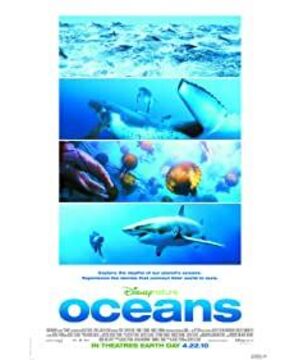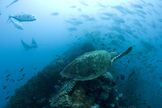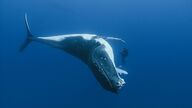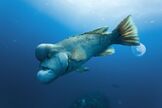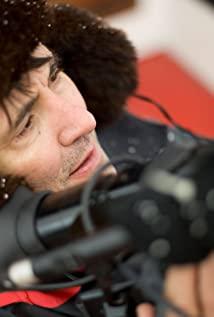Therefore, being able to choose "the man of the sea" Jiang Wen to dub "Ocean" is probably the only weapon for the movie's publicity. As a documentary, the starting point of "Ocean" is very low, and most people don't even know its release, and the theater lineup is not strong. As for Jacques Behan, I am afraid that Chinese audiences with a higher cultural level only know a French director, and his name is Luc Besson.
According to the photo, Jiang Wen is supporting them almost as a charity, to the effect that he does nothing. Once too much publicity expense is invested, it will cause the cost to be difficult to recover. After all, China is not like South Korea. A "Sound of Cow Bell" about old cows and old men can be sold to 3 million people (about 120 million yuan in box office revenue). Let the audience spontaneously support excellent documentaries or art films, and a good atmosphere is far from being formed.
Of course, regardless of the type of documentary, the advantages of "Ocean" are also very obvious. It is of high quality, which is a major reason for the introduction. Jacques Behan has produced "Micro World", "Himalayan" and "Migrating Birds", and he is well-known. "Ocean" also lasted five years and cost a lot of money. It continued to use advanced photography technology to present shocking images. Secondly, it is the summer vacation, and there are students and children in the specific audience of "Ocean". It's just that compared to poorly produced cartoons, parents are still not proactive enough in choosing documentaries.
Just last summer, the mainland also released a "Deep Sea Quest". It was produced in 3D and also talked about marine life. It was all strange. However, the pattern presented was too small. The main story was nothing more than a little turtle looking for a mother. Popular science movies for children. Oh ah, the non-stop translation of female voices is a nightmare exchange, and everyone in the movie theater is terrified of hearing it. Compared with "Deep Sea Quest", "Ocean" has no 3D gimmicks. Even though the deep-sea images are so fascinating that they produce a certain hypnotic reaction, "Ocean" is because the images are too beautiful, not because the story is too low and young ("Deep-Sea Quest" is just a terrible story for children). It is really to be compared, "Ocean" "The expression technique is already at the level of classical opera. Whether it is a hymn or chant, it is indeed graded.
In previous documentary filming, Jacques Behan has accumulated rich experience. From microscopic photography (macro photography) to shooting in harsh environments to long-term aerial photography, he has opened the door to another world for the audience. Discovery Channel’s shows do sell well, but Jacques Behan can also make works that surpass them. The length of the movie is limited, so a lot of precious material must be discarded. He will wait a few years for the storm to come. Perhaps this is the difference between film and TV.
Although there are traces of human beings, there are clues that lizards go into the water and dolphins chase and play, but "Ocean" cannot be said to have a plot story. The film first shows the magnificent and surging waves of the ocean. The waves burst into white foam, endless. Then, it talked about the food chain of the ocean, like seals eating fish and sharks hunting seals. In the middle of the tornado-like school of fish, seabirds dived into the sea like an air-to-surface missile to prey on sardines. The little turtles that had just hatched from their shells were hunted down all the way, and the lucky ones climbed into the sea. These scenes were thrilling and really hard to shoot. Portray. In this life, it is difficult for almost everyone to see similar scenes with their own eyes. Even if they do, the recognition of human eyes is difficult to compare with that of high-speed cameras, and the visual effect is greatly reduced.
This is what "Ocean" needs to do: underwater photography, combined with remote remote control up and down, or long-term, close-range follow-up shooting. It doesn't seem difficult to say it, and there are many people who have used it, but Jacques Behan Destined to be a perfectionist, he will pick out the best parts and edit them later. Once this is done, even if "Ocean" does not have a 3D stereoscopic effect, it can be shocking and convenient, it is really no worse than 3D. Moreover, 3D always has a curious vision, which is probably the opposite of the pursuit of "Ocean".
Strictly speaking, the strange creatures are indispensable in "Ocean", like the fish with the old man's head, but compared to blind exploration, it seems to be deliberately restrained. For patients with intensive things phobia, "Ocean" also has a lot of performances, and it is a bit disturbing to watch, such as the section of crabs going to the market.
After the great nautical era, mankind gradually broke the tranquility of the ocean, the original food chain was broken, and the damage became more and more serious. The limelight in the second half of "Ocean" turned to the ultimate appeal of environmental protection. From the bloody collection of shark fins to the killing of whales, "Ocean" has changed its posture, directly becoming the famous "Dolphin Bay". When humans are unable to introspect, the film talks about the destroyed Antarctic and North Pole, and then uses amazing storms and big weather to express the anger of the ocean. In the vast ocean, a huge wave violently attacked a ship with infinite power.
The slightly regrettable part of "Ocean" is the summary statement. It carried out some old-fashioned preaching and called on everyone to take action. However, creating a scene where humans can swim with sharks is probably beyond most people's cognition. It’s a good thing to dig out the heart and lungs, and it’s also a good thing to wake up the audience. It can be done with cute seals and injured sharks. However, when the alarm is issued, I tell my friends that I don’t need to watch the film to know that this is another environmental protection principle. Doctrine film. If we say that compared to the direct accusations against the Japanese in "Dolphin Bay," the author's inclinations are extremely obvious, and he can completely incite the audience to attack. In "Ocean", the author's point of view has deviated. He put his emotions on the animals and made appeals. But the relationship between man and nature, man and sea creatures is irretrievable. This is not a lost link, it can be reconnected. If you lose a link, this ocean is no longer the ocean it used to be, and it can no longer be connected. From this point of view, some facts are desperate. When Jacques Behan took his son to see specimens of marine life, the pessimistic tone of "Ocean" had reached its climax. Although it has successfully awakened the hearts of many people, mankind is actually hopeless. 【International Herald Guide】
View more about Oceans reviews


